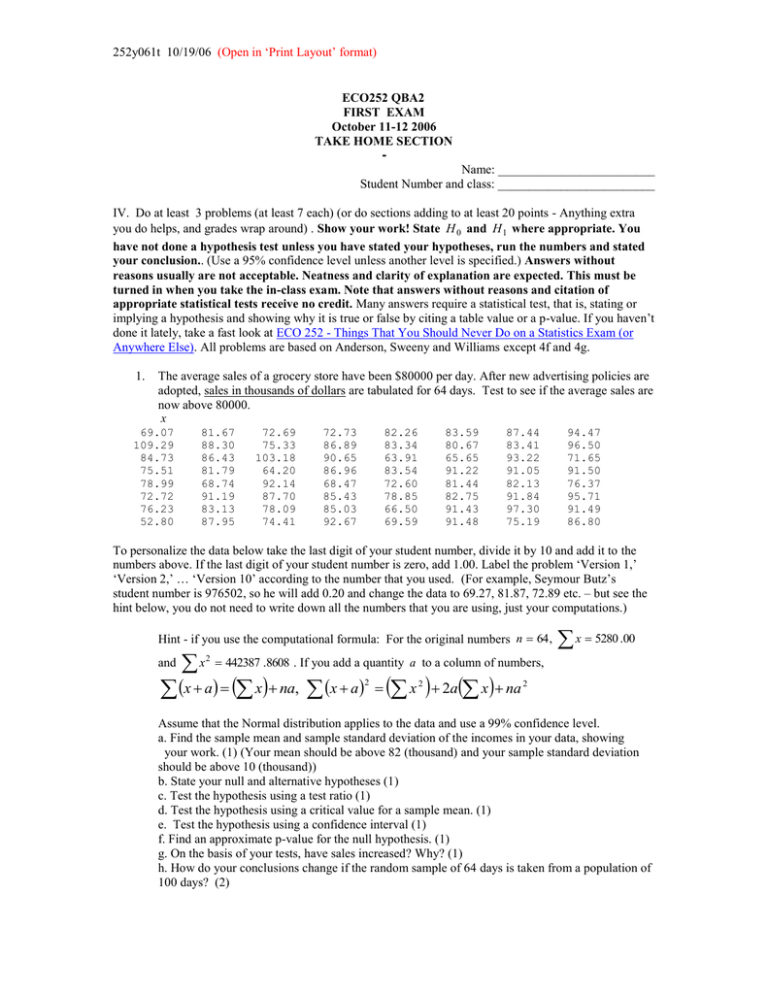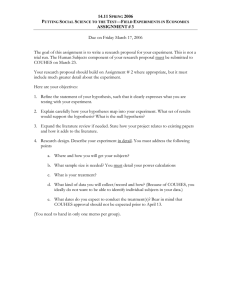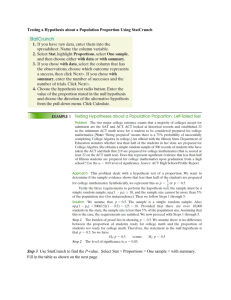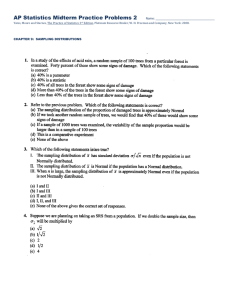Document 15929750
advertisement

252y061t 10/19/06 (Open in ‘Print Layout’ format) ECO252 QBA2 FIRST EXAM October 11-12 2006 TAKE HOME SECTION Name: _________________________ Student Number and class: _________________________ IV. Do at least 3 problems (at least 7 each) (or do sections adding to at least 20 points - Anything extra you do helps, and grades wrap around) . Show your work! State H 0 and H 1 where appropriate. You have not done a hypothesis test unless you have stated your hypotheses, run the numbers and stated your conclusion.. (Use a 95% confidence level unless another level is specified.) Answers without reasons usually are not acceptable. Neatness and clarity of explanation are expected. This must be turned in when you take the in-class exam. Note that answers without reasons and citation of appropriate statistical tests receive no credit. Many answers require a statistical test, that is, stating or implying a hypothesis and showing why it is true or false by citing a table value or a p-value. If you haven’t done it lately, take a fast look at ECO 252 - Things That You Should Never Do on a Statistics Exam (or Anywhere Else). All problems are based on Anderson, Sweeny and Williams except 4f and 4g. 1. The average sales of a grocery store have been $80000 per day. After new advertising policies are adopted, sales in thousands of dollars are tabulated for 64 days. Test to see if the average sales are now above 80000. x 69.07 109.29 84.73 75.51 78.99 72.72 76.23 52.80 81.67 88.30 86.43 81.79 68.74 91.19 83.13 87.95 72.69 75.33 103.18 64.20 92.14 87.70 78.09 74.41 72.73 86.89 90.65 86.96 68.47 85.43 85.03 92.67 82.26 83.34 63.91 83.54 72.60 78.85 66.50 69.59 83.59 80.67 65.65 91.22 81.44 82.75 91.43 91.48 87.44 83.41 93.22 91.05 82.13 91.84 97.30 75.19 94.47 96.50 71.65 91.50 76.37 95.71 91.49 86.80 To personalize the data below take the last digit of your student number, divide it by 10 and add it to the numbers above. If the last digit of your student number is zero, add 1.00. Label the problem ‘Version 1,’ ‘Version 2,’ … ‘Version 10’ according to the number that you used. (For example, Seymour Butz’s student number is 976502, so he will add 0.20 and change the data to 69.27, 81.87, 72.89 etc. – but see the hint below, you do not need to write down all the numbers that you are using, just your computations.) Hint - if you use the computational formula: For the original numbers n 64 , and x 2 x 5280 .00 442387 .8608 . If you add a quantity a to a column of numbers, x a x na, x a x 2a x na 2 2 2 Assume that the Normal distribution applies to the data and use a 99% confidence level. a. Find the sample mean and sample standard deviation of the incomes in your data, showing your work. (1) (Your mean should be above 82 (thousand) and your sample standard deviation should be above 10 (thousand)) b. State your null and alternative hypotheses (1) c. Test the hypothesis using a test ratio (1) d. Test the hypothesis using a critical value for a sample mean. (1) e. Test the hypothesis using a confidence interval (1) f. Find an approximate p-value for the null hypothesis. (1) g. On the basis of your tests, have sales increased? Why? (1) h. How do your conclusions change if the random sample of 64 days is taken from a population of 100 days? (2) 252y061t 10/19/06 (Open in ‘Print Layout’ format) i. Assume that the Normal distribution does not apply and, using your data, test that the median is above 80000. (3) [12] j. (Extra credit) Use your data to get an approximate 99% 2-sided confidence interval for the median. 2. Once again, assume that the Normal distribution applies, but assume a population standard deviation of 10 (thousand) and that we are testing whether the mean is above 80 (thousand). (99% confidence level) a. State your null and alternative hypotheses(1) b. Find a p-value for the null hypothesis using the mean that you found in a. On the basis of your p-value, would you reject the null hypothesis? Why? (1) c. Create a power curve for the test. (6) [20] 3. Nationwide 16.5% of all CEOs have advanced degrees. You take a survey of a random sample of 160 CEOs in your city and find that 24 a have advanced degrees, where a is the second to last digit of your student number. (For example, Seymour Butz’s student number is 976512, so he will subtract one and say that x 24 1 23 .) Label your solution ‘Version a ,’ where a is the number that you are using. Is the fraction of executives that have advanced degrees in your city significantly less than the national percentage. a. Formulate your null and alternative hypotheses and do a hypothesis test with a 99% confidence level. (2) b. Find a p-value for the null hypothesis. (1) c. (Extra credit) How would your answer to a) change if your sample of 160 came from a population of 200? (1) d. (Extra credit) Using a critical value of the proportion for testing your null hypothesis, create a power curve for the test by using the alternate hypothesis and finding the power for values of p1 .165 . (Up to 6 points) d. Assume that the proportion of CEOs in your city is the observed proportion in part a, how large a sample would you need to estimate the proportion above that have Advanced degrees with an error of .001? (2) e. Use the proportion that you found in a) to create a 2-sided 99% confidence interval for the proportion. Does it differ significantly from .165? Why? (2) [28] 4. Standard deviation is often a measure of reliability. A manufacturer is claiming that the equipment in use to fill bottles fills the bottles so that the standard deviation is 0.1 oz or less. You take a sample of 20 bottles and get a sample standard deviation of 0.110 a . To get a take the third to last digit of your student number and multiply it by 0.001. (For example, Seymour Butz’s student number is 976502, so he will add .005 and say that s 0.110 0.005 0.115 . ) Label your solution Version a . a. Formulate the null and alternative hypotheses necessary to see if the standard deviation is not more than 0.1 and test the hypothesis using a 99% confidence level and a test ratio. (2) b. What assumptions are necessary to perform this test? (1) c. Try to get a rough p-value. Interpret its meaning (1) d. Do a 99% two- sided confidence interval for the standard deviation (1) e. (Extra credit) Redo 4a) using an appropriate confidence interval. (2) f. (Extra credit) Find a critical value for s in 4a). (1) g. Do a. again assuming that you took a sample of 110 bottles. (2) f. A machine supposedly requires adjustment at most once a month. Last month, however it needed to be adjusted 3 times. Assuming that the Poisson distribution applies and using a 5% significance level, is there something wrong? (2) g. Over a period of 5 years the average number of accidents per year on a stretch of highway was 30. The speed limit was reduced to 45 mph and there were only 4 accidents in a 3-month period. Use the Poisson distribution to test if there has been a significant reduction in accidents. Use a 5% significance level. (2) [42]




